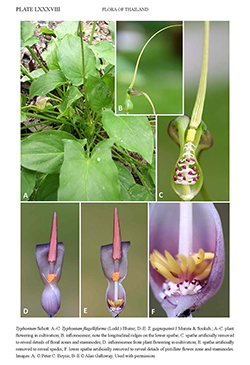e-Flora of Thailand
Volume 11 > Part 2 > Year 2012 > Page 308 > Araceae > Typhonium
12. Typhonium gagnepainii J.Murata & Sookch.
Aroideana 24: 38. 2001. Plate LXXXVIII: D–E.
Accepted Name : This is currently accepted.
Synonyms & Citations :
Description : Small, seasonally dormant herb to 30 cm tall. Stem a short tuberous rhizome, 1.2–1.8 cm by 7–13 mm. Leaves few together; petiole 12–30 cm long, covered with minute glandular hairs; leaf blade triangular, distinctly hastate, veins on the lower surface covered with glandular hairs, anterior part ovate to broadly ovate, 4–10 by 4–11 cm, acute, posterior lobes triangular-ovate to broadly lanceolate, 4–9 by 1.5–6 cm. Inflorescence appearing after the leaves; peduncle 1–5 cm long; spathe 2.4–4 cm long, lower part and spathe limb separated by a constriction; lower part ovate, 7–9 by 5–6 mm; spathe limb oblong-lanceolate, 1.7–3 cm long, oblique; spadix nearly as long as the spathe, 2.2–3.5 cm long; pistillate flower zone ca 2 mm long; sterile interstice 7–12 mm long, lower 1 mm with staminodes, rest naked; staminodes clavate, ca 2 mm long, apex subtruncate; staminate flower zone 7–10 mm long; appendix narrowly conical, 6–10 mm long, short stipitate. Fruits not seen.
Thailand : NORTH-EASTERN: Mukdahan (type: Kerr 21442, holotype -K, isotype -BK); SOUTH-WESTERN: Kanchanaburi (type: Larsen, Smitinand & Warncke 1533, holotype -BKF, isotype -AAU).
Distribution : Cambodia.
Ecology : Rocky, deciduous forests; ca 200 m alt.
Vernacular : Utta phit noi (อุตพิดน้อย)(Mukdahan).
Notes: Typhonium gagnepainii closely resembles T. medusae and T. pusillum in general inflorescence and leaf morphology but can be distinguished by the shape of its staminodes.

